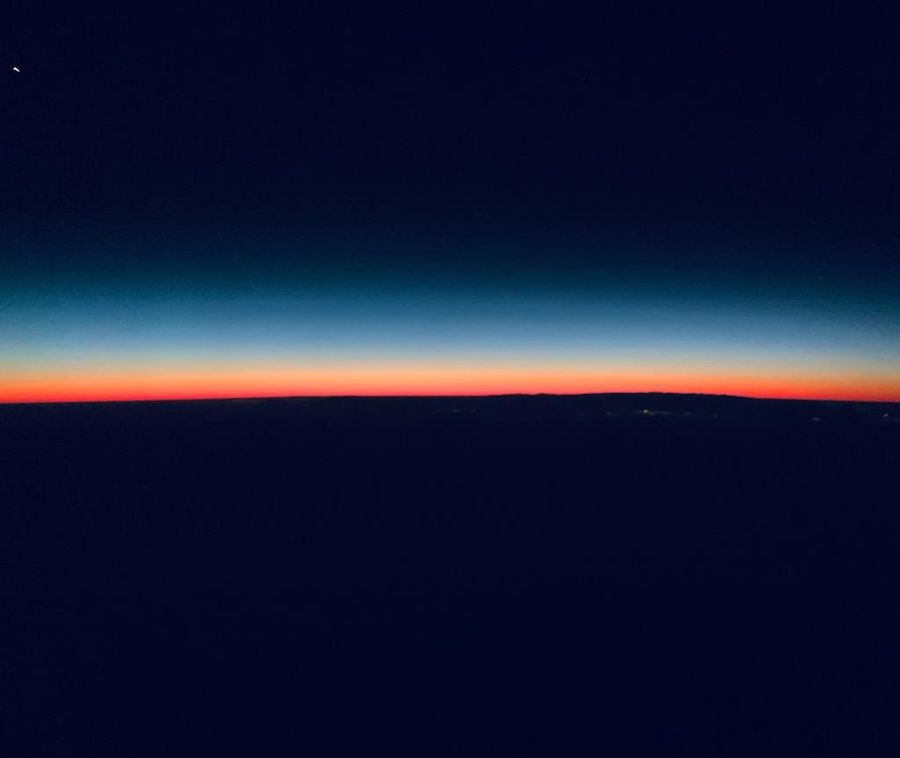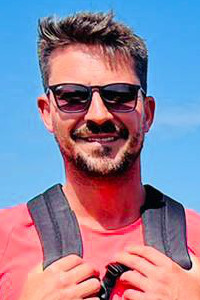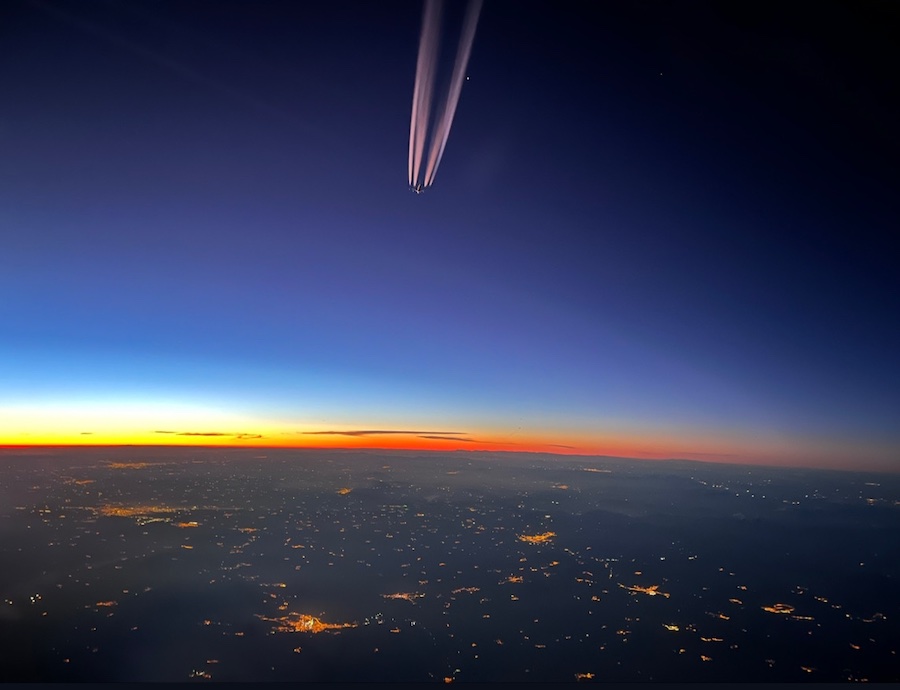On the Wings of Prayer by Michael Ford
When Stuart Beech looks through his cockpit window and watches in awe as the sun rises over the equator, he instinctively finds himself praying. As an international airline pilot from London, he is no stranger to the skies over South Africa, the Far East, or the United States.
The pressures of his demanding job, requiring him to be at the peak of fitness and technical expertise, are more than rewarded by the mesmerizing vistas which come before him at 38,000 feet, offering him “the big-picture view of the world” as well as a chance to think deeply as he monitors the aircraft.
On a flight from London to Johannesburg, Stuart captured for Today’s American Catholic a majestic moment that few people experience. With his co-pilot in control of the aircraft, he took this picture, being aware of “a form of a super being in the universe,” with energy radiating through the beauty of early morning light.

Stuart logged his description, sending it to me by text as soon as he landed: “I currently sit here at 38,000 feet, 22 minutes after passing the equator en route to South Africa. The sunrise has commenced. I observe to the east the most magical and biblical setting. As pilots, we are a little closer to the heavens above and feel we have been blessed by what we witness in the morning. We never see the same spectrum of colors twice as the morning light refracts through a warm equatorial atmosphere. To the left is shining Venus, our closest and spiritual neighbor. One asks the question why the universe is so vast, and who or what is blessing us with such a divine experience?”
Stuart says that sometimes, during a long overnight flight, he feels he should really be asleep. But then he’s more than compensated with “an almost euphoric feeling” when he watches the sunrise and looks in awe at “the power, the simplicity and the complexity” of nature. “It has been known for me to say a prayer when the sun comes up. It’s such a tranquil place up there. I feel detached from the modern world and society. Man has created something artificial in terms of the aircraft. But the aircraft does enable you to look at the beauty of the natural earth from that bird’s-eye viewpoint.”
Stuart senses the transcendent or the eternal as he contemplates from the cockpit. His perceptions are reminiscent of words from the late South African prelate, Archbishop Desmond Tutu, who asked: “Are we not often awestruck before the grandeur of some imposing mountain range or when we behold a glorious sunset or a still moonlit night with the stars winking in a dark blue sky? Our instinctive worshipfulness comes to the fore with all these created things.”
The African worldview maintains that all life is sacred. The religious and the secular, or the material and the spiritual, are not distinct entities but interconnected, all of a piece. The spiritual is real and permeates all existence. A South African Zulu once wrote: “The source of being is above, which gives life to all people,” while the Rozwi people regarded the creator as a Great Spirit “who sews the heavens together like cloth.”
Stuart’s responses also reminded me of a biography of a flying doctor in which the writer described Africa as a continent of fathomless antiquity and radiant joys through which people are transformed. No wonder the Ashanti tribe of Ghana was inspired to pray: “We thank you for all the beauty of the earth. The grace of your creation is like a cool day. The sky above us is like a warm, soft, Kente cloth, because you are behind it.”
Based at London Heathrow, Stuart is a senior flight officer on the Airbus A380, the world’s largest passenger airliner, known as “Barking Dog” and “The Whale” because of the sound of its hydraulics in take-off and landing.
A warm, affable, and talented man, he’s known as Britain’s “Singing Pilot” who performs on stage, radio, and television. We became friends a few years ago after I watched him being surprised on a top TV show when he was unexpectedly invited to sing in front of a packed theater. His genial manner and impressive vocal range endeared him to the enthusiastic audience. Professional to his fingertips, Stuart also demonstrates a natural care and concern for other people.
Since qualifying at the age of 25, Stuart had clocked up almost 10,000 airmiles—until the pandemic struck and fleets were grounded around the world. Like many employees in Britain, Stuart was “furloughed,” which meant living on a reduced but manageable salary subsidized by the government. He was naturally devastated by the impact of Covid-19 but determined to support his colleagues, especially those with young families who were finding life challenging.
Stuart helped found Resilient Pilot, an online self-development program for pilots and cabin crew. The virtual, non-profit organization has kept staff connected and engaged, even when they needed to find other jobs in the interim. As chief operating officer, Stuart has been responsible for weekly webinars and a voluntary staff of 60 mentors and coaches. There are now 6,000 members across the globe.
The impact of the pandemic, which led to many redundancies and displacements in his industry, also resulted in a disturbing number of pilot suicides around the world. One aim of Resilient Pilot has been to support people with mental health issues; there are specific pathways in place for people suffering from depression. As the industry continues to prepare for its full return, which may take several years, the importance of retraining the workforce to high standards has never been more crucial. Resilient Pilot offers three pillars of primary support: well-being, professional competence, and employability. “We thought the industry would recover sooner than it has but, as we speak, we are still in a phase of recovery. The UK is taking longer than the US. We are trying to keep crew competent, confident, skilled and qualified,” Stuart says.
After a long, frustrating absence from the airways, Stuart returned to the skies in October 2021, flying initially to Atlanta. “It was like a blur that day—as though 18 months in lockdown had never really happened.”

Stuart Beech
Immaculately attired in his pilot’s uniform, Stuart drove me around his hometown of Oldham in northern England, pointing out the house where he’d grown up and the first school he’d attended. He was just a young boy when his grandfather regularly took him to a pub at the end of the runway at Manchester Airport so they could watch planes taking off and landing. “That’s when the seed was planted. It was always a lifelong dream to become a pilot. It’s been my passion.”
We drove on to Hathershaw College, built in the 1950s in the shape of a Lancaster bomber. The British aircraft manufacturer, Avro, produced thousands of bombers at a nearby plant during the Second World War. The Avro Lancaster carried the heaviest bomb load and took part in the famous Dam Busters’ raid. The school’s design was in recognition of the plane’s performance, even though it symbolizes a weapon of mass destruction.
It was while Stuart was a teenage pupil that he discovered a vocation to sing. He became a soloist with the Hathershaw Choir and vividly recalls his performance of the gospel classic “Oh Happy Day.” In addition to his artistic talents—he also plays the double bass—he has a focused, scientific mind.
After studying aerospace engineering at university, it was difficult to secure a footing in the airline industry in the wake of cutbacks after 9/11, so Stuart returned to his old college and became a successful teacher of mathematics. “What 9/11 did was to quash a lot of dreams of aspirational pilots. It turned the whole industry upside down with a three- or four-year setback.”
A long-term career in education might well have flowered, but from the playing fields Stuart couldn’t take his eyes off Manchester Airport. As he glanced out of his classroom window every day, he kept finding himself entranced by aircraft landing on the approach. “I remember plain as day just watching and thinking it was time to change. As the dream had stayed with me for so long, it was the right time to do something about it.”
So, in between planning lessons and marking books, Stuart applied to a flight training school to gain his pilot’s license. But this meant he had to secure a bank loan for £100,000 ($123,400 in 2023 dollars) on the proviso he passed all his exams along with his medical. He needed £80,000 for the two-year training and £20,000 for living costs. When his father asked him if he knew what he was doing, he replied with conviction: “I know.”
After training for 18 months in New Zealand and the United Kingdom, Stuart qualified and worked on European routes for seven years. He has since flown frequently to Boston, Washington, Miami, Chicago, San Francisco, and Los Angeles; to Cape Town and Johannesburg; and to Singapore and Hong Kong. Only once has he experienced a major emergency when a passenger suffered an aneurysm on a trip to Miami, but, as the plane was close to its destination, he was able to arrange for an emergency ambulance to be waiting on landing.

Photo by Stuart Beech taken just south of Jerusalem, December 2022
Highly respected by his peers and bosses, Stuart was one of three pilots invited to meet the Queen when she visited his company. But he sits lightly to all of that and keeps his feet firmly on the ground. For many years, he has gone into schools to inspire, educate, and maintain the next level of aviation professionals. Pilots, he tells pupils, need to be calm, collected, and rational, as well as competent in teamwork, decision-making and organizational ability. These traits and skills can be cultivated from a young age. He was awarded a first-class master’s degree in airline management with an original thesis on next generation aviators.
Being an international pilot is a highly responsible role, requiring a multitude of skills and aptitudes, all geared to the safety of passengers. There are, of course, perks, but none can quite match that spiritual view from the cockpit window as day is dawning. “You certainly feel in the moment and marvel in what you see,” says Stuart, who grew up as an Anglican. “The power of God is presenting us with a new day, giving us life. You’re about as close to space as you can get without going into it. In a quiet moment, I’ll have a look at my faith. At one time, various things were going on in the family and that was the time to bring that up. I am closer to the outer atmosphere, beyond life on earth, so I think I do get spiritual insights. The colors can be very, very stark on the black horizon but then I see blues, yellows, and reds as the sun comes up. It’s absolutely stunning. Beautiful. A visual prayer.”
Like an astronaut who has explored space and seen our planet from above, Stuart points out that as a pilot he feels a unity with the earth. “As I fly over various isolated land masses, I appreciate what Mother Earth has to offer. For example, when I’m going over the Himalayas, which look so remote and uninhabited, it comes home to me that this is a unique way of seeing them and I do feel a unity. You witness landmarks, the geography, a perspective other people don’t see, such as flying over Greenland towards the North Pole when it’s complete light.
“There has to be more than what our eyes take in. We can only see a very small percentage of what is there. I find the experience dynamic, inspiring me to live well by my values, and also to learn. It doesn’t happen on every flight, especially if there’s cloud formation. But when it does, it’s heavenly.” ♦
Michael Ford is a biographical writer and ecumenical theologian living in the UK. His features for TAC reflect a lifelong interest in the spiritual and psychological journeys of women and men from all walks of life. He may be contacted at hermitagewithin@gmail.com.





Leave a Reply
Want to join the discussion?Feel free to contribute!